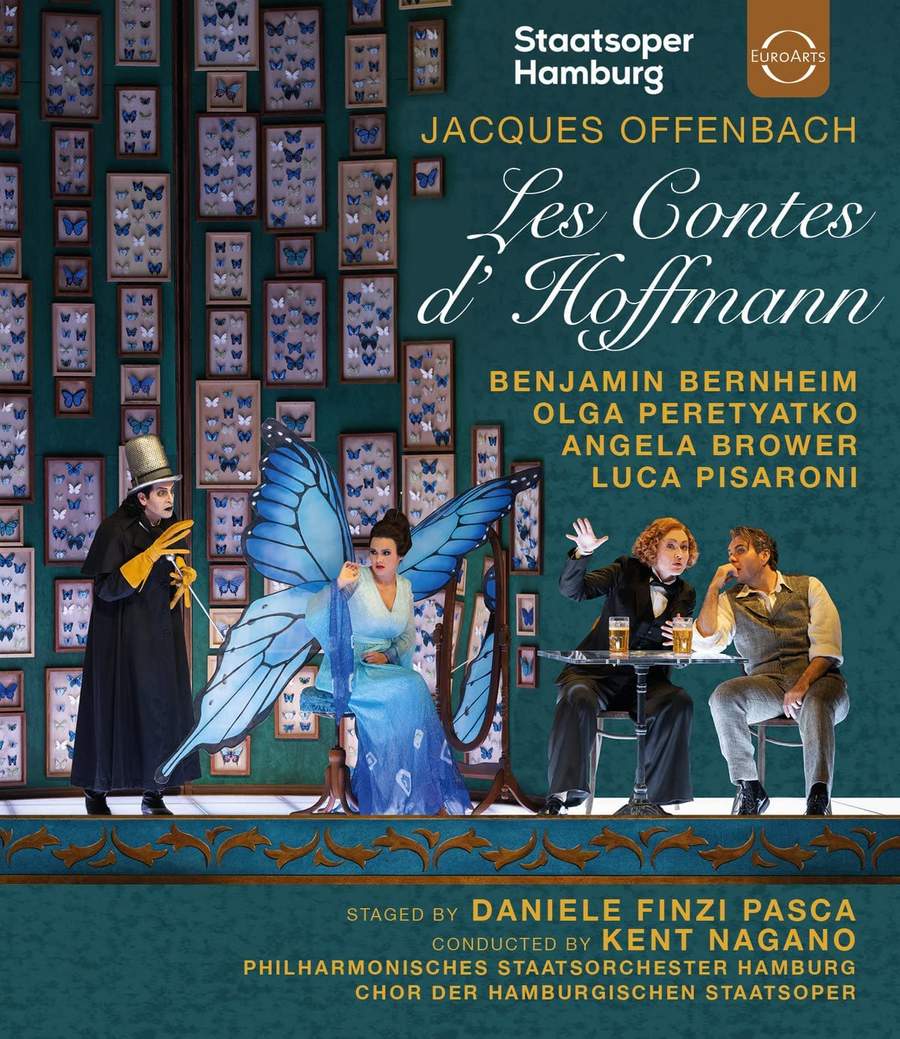OFFENBACH Les Contes d'Hoffman (Nagano)
View record and artist detailsRecord and Artist Details
Genre:
Opera
Label: Euroarts
Magazine Review Date: 04/2022
Media Format: Digital Versatile Disc
Media Runtime: 180
Mastering:
DDD
Catalogue Number: 206 8598

Tracks:
| Composition | Artist Credit |
|---|---|
| (Les) Contes d'Hoffmann, '(The) Tales of Hoffmann' |
Jacques Offenbach, Composer
Andrew Dickinson, Andrès; Cochenille; Pitichinaccio; Frantz, Tenor Angela Brower, Nicklausse; Muse, Mezzo soprano Benjamin Bernheim, Hoffmann, Tenor Hamburg State Opera Chorus Hamburg State Philharmonic Orchestra Jürgen Sacher, Spalanzani, Tenor Kent Nagano, Conductor Luca Pisaroni, Lindorf; Coppelius; Dr Miracle; Dapertutto, Bass-baritone Martin Summer, Crespel; Luther, Bass Olga Peretyatko, Olympia; Giulietta; Antonia; Stella, Soprano |
Author: Richard Bratby
What do you want from Les contes d’Hoffmann? Enchantment or insight? Delirious high-Romantic fantasy or probing Jungian psychodrama? False dichotomies, of course, but useful benchmarks when appraising an opera that revolves around ideas of reality and illusion, and the inner and outer life of a creative artist. Think of it as a spectrum; possibly it’s just me, but coming relatively soon after Tobias Kratzer’s powerful updated staging for Dutch National Opera (C Major, 6/20), this lavish new production from the Hamburg Staatsoper feels like it skews heavily towards the romantic end of the scale.
Which is not to say that it lacks imagination – or that it fails to acknowledge the psychological complexities of this endlessly fascinating opera. Early on, director Daniele Finzi Pasca presents us with a crowd of white-coated medics (psychiatric or otherwise is not made clear). At various points in the drama, medical staff flood the stage, and in Act 4 the chorus have become a flock of pigeons: shades of Hitchcock. Hoffmann and his Muse (already a double-sided character) occasionally manifest silent onstage doppelgängers – an idea that rarely works well in the theatre but whose impact here is tactfully minimised by the video director.
Meanwhile, in the reflection-obsessed Venetian act a vast mirror projects the audience back at itself, and throughout, the character of Coppélius/Dr Miracle/Dapertutto has uncannily long, Nosferatu-like fingers. But in the framing scenes, as Lindorf, he’s made up to resemble Offenbach himself: the omnipotent puppet master of his unhappy creations. He’s clearly not real (those fingers are genuinely creepy); so then, you wonder, who is? In short, there’s plenty here to wrap your head around – if you’re that way inclined.
And if you’re not (or even if you are): well, sit back and enjoy the show, because this is as handsomely staged a Hoffmann as you’re likely to see, painted in rich shadows and glowing golds, and adorned with period costumes (broadly belle époque in style) and countless touches of gracefully handled stage magic. Imaginary characters appear in mid-air – so that’s what Kleinzach looks like! – or suddenly lift off into flight. Olympia appears inside a rococo musical box, and, in a ravishing flight of fantasy, Antonia is a butterfly, trapped in a cabinet of pinned butterflies, with rippling silken wings.
In fact, this is one of those rare productions of Hoffmann where the living (but all-too-fragile) girl upstages the mechanical doll, and Olga Peretyatko is intensely touching as both – giving Olympia a richly expressive voice to offset her clockwork movements and bringing a soaring ardour and a luminous fragility to Antonia. She’s barely recognisable (but no less potent, vocally) as the femme fatale Giulietta. But then, she has an outstanding Hoffmann to play against. True, Benjamin Bernheim’s poet spends a fair amount of his time slumped morosely over a beer glass, but that can’t detract from some serious leading-man presence and a lyrical, authentically Gallic tenor that seems to get richer and more passionate the higher it goes.
These two would be worth the price of admission alone but Luca Pisaroni is as sonorous as he is versatile in his four-way villainy, and if Angela Brower’s pert, brightly sung performance as Nicklausse/the Muse couldn’t quite eclipse my memories of Irene Roberts’s compassionate, intensely human reinvention of the role for Kratzer in Amsterdam, she brings a sparky objectivity to what can be a fairly heady overall musical and dramatic experience. Kent Nagano sweeps it all along with sensuality and verve; the Hamburg orchestra is on colourful form and for a staging that is (essentially) a piece of glorious escapism, it leaves you with a surprising amount to ponder – and doesn’t outstay its welcome, either.
Discover the world's largest classical music catalogue with Presto Music.

Gramophone Digital Club
- Digital Edition
- Digital Archive
- Reviews Database
- Full website access
From £8.75 / month
Subscribe
Gramophone Full Club
- Print Edition
- Digital Edition
- Digital Archive
- Reviews Database
- Full website access
From £11.00 / month
Subscribe
If you are a library, university or other organisation that would be interested in an institutional subscription to Gramophone please click here for further information.




